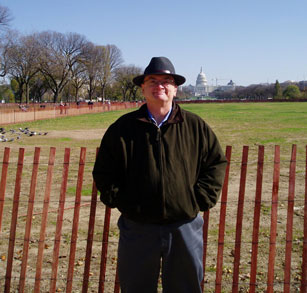
Professor Emeritus, and former Director of Graduate Studies and Departmental Chair, Political Science, and
Senior Research Fellow, and former Director, Ostrom Workshop in Political Theory and Policy Analysis,
and former Associate Dean for Social & Historical Sciences and Graduate Education, College of Arts and Sciences,
Indiana University, Bloomington

I am a product of the Big Ten and the Cold War. While growing up on a farm in northwestern Ohio, I never imagined going to school anyplace other than THE Ohio State University. (Go Bucks!) I ventured way up north to the University of Minnesota for graduate study and south to Indiana University for my first (and only) academic job, from freshly minted Assistant Professor (1985) all the way through to blessed retirement (2019). This gives me a unique perspective on IU Bloomington, which, at a mere 40,000 resident students (in the pre-covid-19 era), is the smallest university I have ever known.
I may have lived all my life in the Midwest, but I've always been fascinated with world politics. The Cold War reached all the way into rural America, inspiring "duck and cover" drills in which we schoolchildren pretended to learn how to survive a nuclear war. I have vivid memories of reading weekly issues of U.S. News & World Reports (and other old-fashioned print media) festooned with maps featuring menacing splotches of red that signified the then-expanding Communist threat.
From an early age I was fascinated by politics, maps, and math. My career plans never crystallized until I realized that is possible to use math to study politics, the primary driving force behind the different colors in my beloved maps. At The OSU I majored in mathematics, and in my Ph.D. dissertation in Political Science, I used rational choice theory and game theory to model the puzzling ways in which rival regional powers cozied up to the superpowers to get access to arms and military assistance, even if doing so required them to switch sides in the Cold War (even if only temporarily). For my next project I turned to the superpowers themselves, using rational expectations models and time-series statistics to study arms races and arms control negotiations. Personally, I was inconvenienced by the end of the Cold War. I had to abandon my favorite courses on such suddenly irrelevant topics as the nuclear arms race, arms control, and other aspects of superpower rivalry, and move on to other topics.
My subsequent research was deeply shaped by the influences of Vincent and Elinor Ostrom, who had established in 1973 the Workshop in Politial Theory and Policy Analysis where I now enjoy an emeritus office (having helped implement a change in its name to honor their legacy). Initially trained in the study of conflict between nation-states, I came to approach international politics from a broader perspective of public policy as interactions among public, private, and many other types of organizations. I began looking at global conflict policy, by which I meant the response of national governments, international organizations (IGOs), and nongovernmental organizations (NGOs) to the humanitarian consequences and security implications of local and regional conflicts (like the ones I had studied in my dissertation). Eventually I came to accept that the Cold War had indeed ended, and moved on to the study of religion policy, once I began to appreciate the unique contributions of faith-based organizations (FBOs) in the design and implementation of policies related to humanitarian relief, development assistance, peace-building, and reconciliation in troubled regions of the world, as well as standard services such as education, health care, and welfare assistance in societies less directly challenged by the ravages of war.
Currently, I am involved in a long-term research project on the ways in which health care policy in the U.S. can be improved through increased collaboration among stakeholders at the community or regional level, as well as other efforts to introduce principles of polycentric governance into our current "system" of health policy. For this research I draw inspiration from the pioneering research of Lin Ostrom, my Nobel-prize winning colleague and friend, on the diverse ways local communities manage resources critical to their own survival and work together to develop institutions of self-governance.
While studying all of these topics, I learned that we need to listen to, and learn from, the experiences of people in all areas of the world, if we are to have any hope of crafting modes of governance sophisticated enough to meet the many challenges facing the great American Midwest and all the other interesting places on those fascinating things called maps. Oh, and the Big Ten conference has had 14 members for several years now -- so much for the supposed exactitude of mathematics! At least the Cold War is still dead (I hope).
General Info Research Teaching Service
Last Modified:18 August 2020
URL https://mcginnis.pages.iu.edu/
Send comments
to mcginnis@indiana.edu
Copyright 2002, The Trustees
of Indiana University